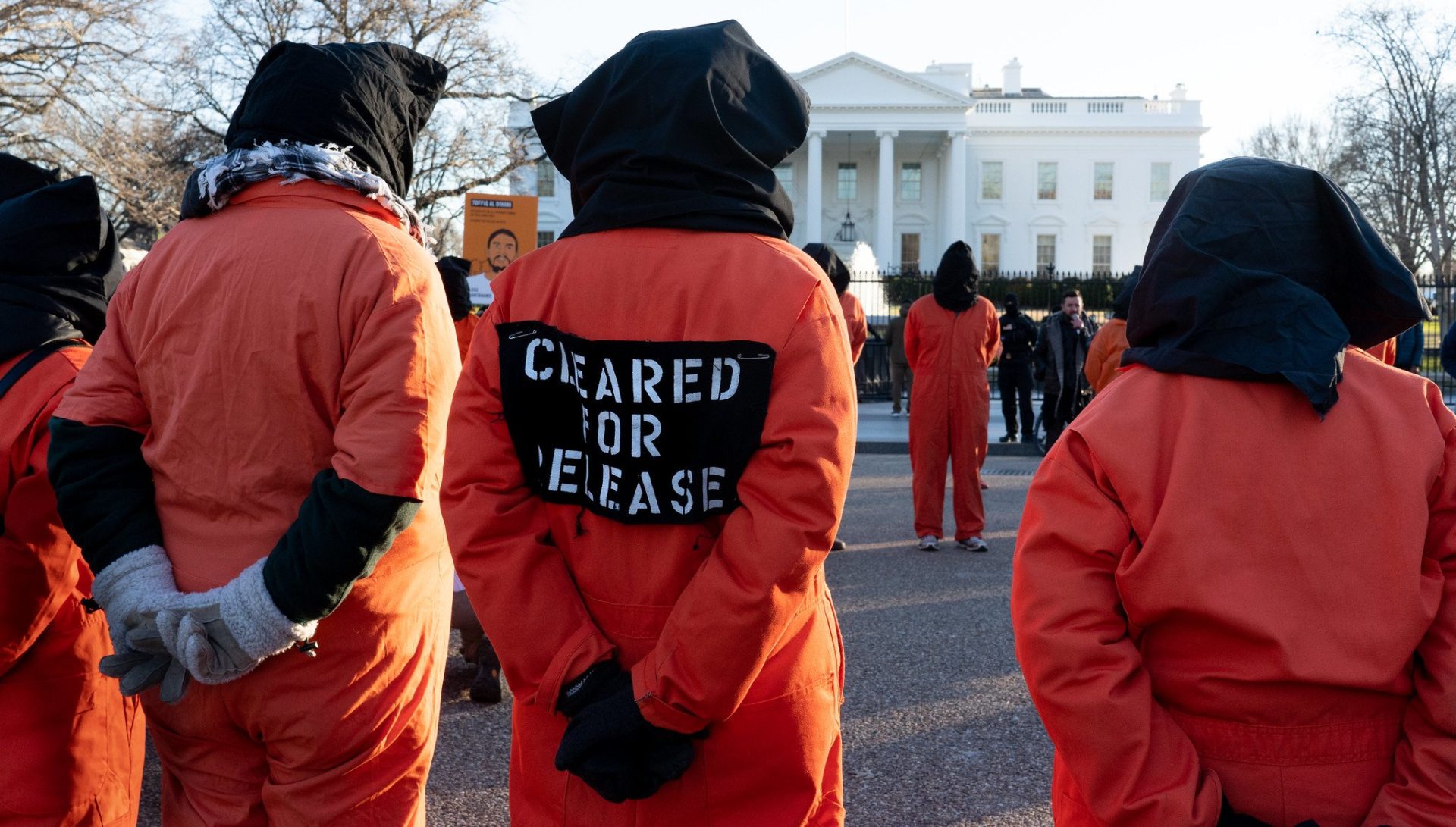
On Friday, the Periodic Review Board (PRB) announced it was recommending the transfer from Guantanamo to Saudi Arabia of Mohammed al-Qahtani, a detainee who is among several the government has claimed was the 20th hijacker. He is deemed too impaired to pose a future threat, following two months of brutal interrogation in late 2002 and early 2003 at Camp X-Ray and a traumatic brain injury he suffered as a child.
This PRB recommendation follows a series of other clearances since Biden took office. On January 11, the 20th anniversary of the arrival of the first detainees in the war on terror to Guantanamo, the administration announced it was clearing five detainees for transfer. And last September, the administration cleared three more transfers, a total now of nine in the current administration. As of this writing, 39 remain in detention, a far cry from the nearly 700 housed in the prison at its apex.
Is the administration finally trying to shut down the prison at the Guantanamo Bay Naval Station (GTMO), as Biden, and before him, Obama, had repeatedly pledged to do? Some perspective is in order.
First and foremost, clearing detainees for transfer does not mean they will be transferred anytime soon. With the Office of the Special Envoy to Guantanamo in the State Department shuttered since 2017, there is currently no governmental entity tasked with conducting the negotiations with foreign governments needed to effectuate transfers.
Furthermore, the recent revelation that the Department of Defense (DoD) is spending upwards of $4 million to build a brand-new courtroom at GTMO in order to hold simultaneous commission proceedings argues against an intent to close the facility in the immediate future. The Commission process has been so painfully slow that in twenty years of operation, not a single detainee has yet been tried and only one conviction by guilty plea has been achieved. If Biden is truly trying to close GTMO, relying on actual verdicts in the commissions pursuant to full-blown trials is unrealistic at best.
It may be that the administration is serious about trying to reduce the detainee population to zero, with a series of transfers, guilty pleas, and trials. But more than emptying the prison is needed to permanently close the facility and ensure that the moral and legal fiasco that is Guantanamo will not make a comeback in the event that there is another major terrorist attack on U.S. soil.
In a recent press release, a working group I co-chaired with former Convening Authority Harvey Rishikof under the auspices of the University of Pennsylvania’s Center for Ethics and the Rule of Law issued a series of recommendations designed to shutter the facility but also to achieve closure on two decades of failed, illegal and immoral policy in the handling of terror suspects by the U.S. government. The press release concludes that “it is critical not only to close the Guantanamo Bay detention facility, but also to take steps to restore the integrity and international standing of the United States by ending this ignominious chapter in U.S. history. Repairing some of the damage . . . will require a legal framework to govern the capture and detention of suspected terrorists in the future, as well as a legal process for adjudicating their cases that not only is consistent with U.S. standards of fair and due process, but that enables swift resolution and justice for the victims and their families.”
To achieve the necessary closure and begin to set the country on a path to restoring integrity to U.S. detention policy, President Biden should focus on three areas of military law and policy.
First, the administration should state unambiguously that henceforth its treatment of detainees captured in war will be governed by international law and the Law of Armed Conflict. It should repudiate the legal gyrations of the Bush administration to justify the use of torture and indefinite detention and make clear that no pronouncement of domestic law or policy can remove detainees from the protections of the Geneva Conventions. It should clarify the status of GTMO detainees and reject the problematic concept of “unlawful combatancy.”
Second, the government needs to repudiate the idea of detention without charges beyond the end of hostilities. Like torture, indefinite detention is illegal under the law of war. Detainees captured and detained in war – whether formal prisoners of war or not – are entitled to humane treatment under common Article III of the Geneva Conventions and repatriation following the cessation of hostilities. Alternatively, civilians who are arrested and detained under U.S. law – as opposed to military law –are entitled to the full panoply of constitutional rights. These rights include the right to have their cases heard before a competent tribunal, the right to challenge the witnesses against them, the right to a speedy trial, and the right to a trial by jury.
In either case, a legal regime that insists that we have the right to indefinitely detain terror suspects without formal charges or access to a legal process for challenging their detention does not comport with either domestic or international law. As Justice O’Connor wrote for the majority in the case of Hamdi v. Rumsfeld, “It is a clearly established principle of the law of war that detention may last no longer than active hostilities.” With the withdrawal of U.S. troops from Afghanistan and an end to active combat in the region, the U.S. is no longer at war in any of the countries of origin of the GTMO detainees, and accordingly, there is no continuing right under any applicable legal framework to hold detainees who are not defendants in a criminal proceeding.
And finally, the government must abandon the veil of secrecy it continues to draw over the treatment the detainees suffered in U.S. custody. In particular, it must reject the use of the state secrets privilege, as well as the assertion of classification protection, as a means of covering up potential prior governmental misconduct.
Instead, as the Ninth Circuit Court of Appeals has recently suggested in a case involving detainee Abu Zabaydah – who is being held incommunicado and without any formal charges or ability to challenge his detention in a U.S. court – the invocation of the state secret privilege should not be based on the government’s desire to shield itself from facts that are “sensitive or embarrassing” to the government. The court wrote: “the rationale behind the state secrets privilege is to protect legitimate government interests, not to shield the government from uncomfortable facts that may be disclosed or discussed in litigation. Protecting the former is an unfortunate necessity in our complicated world of national and international affairs. Protecting the latter is inconsistent with the principle of an independent judiciary.”
Restoration of the rule of law requires the greatest possible transparency regarding the treatment of detainees at GTMO and other black sites. All existing classified reports on these facilities, including the 2014 Senate Select Intelligence Committee (SSCI) Report, should be declassified and released to the public.
These three points are intertwined, of course. The history of torture by the government is the most likely explanation for the government’s insistence on such great secrecy. It may also fuel the push to claim the government’s right to hold detainees indefinitely without charge – a stance that impedes evidence of torture from being asserted in a court of law. GTMO detainees are thus stuck between two legal regimes: the law of war framework that makes up the fundamental rights of those detained in combat under international law, on the one hand, and the domestic law of criminal trials, according to which any individual in U.S. custody is entitled to the basic guarantees of due process, on the other.
The suspended animation in which GTMO detainees have been held – many of them for nearly two decades – is thus the result of an absence of identifiable law governing their status and the insistence on covering up the U.S. government’s abuse of prisoners in its custody. Taken together, the use of illegal interrogation methods, coupled with the insistence on indefinite detention and over-classification has weakened U.S. national security by creating a justifiable basis among our enemies for recruiting others to join their fight against the United States and calling out its hypocrisy in its pretense of the legal process.
After twenty years of operation, and a running total of over 8 billion dollars spent on maintaining the facility since inception in January of 2002, it is hardly an exaggeration to say that GTMO has been one of the greatest failures of U.S. justice. To date, the military commissions at GTMO have achieved only one conviction (through a guilty plea), and the trials of the dozen or so men who have been charged with crimes – only about a third of those interned there – are set to begin no earlier than 2023.
The commissions at GTMO have failed to deliver justice for the families of the victims of 9/11 it promised. As the CERL working group concluded in its press release, “the extremely long delay in reaching closure on existing cases means a lack of justice for the families of the 9/11 victims, some of whom have joined with defense teams to call for the closing of the prison facility and to demand a swift resolution to the stalled commissions process. As the common law maxim states – “justice delayed is justice denied.” But in the meantime, Guantanamo has become synonymous with brutality and Islamophobia – a potential tool for terrorist recruitment among U.S. enemies and a rallying cry for anti-American sentiment in Europe and the Middle East. GTMO has been a journey into some of the darkest recesses of U.S. history as well as a shocking waste of taxpayer dollars.

Claire Finkelstein
Claire O. Finkelstein is the Algernon Biddle Professor of Law and Professor of Philosophy at the University of Pennsylvania Carey Law School. Her research focuses on national security law and policy and related ethical and rule of law issues. In 2012, Prof. Finkelstein founded Penn Law’s Center for Ethics and the Rule of Law (CERL), a non-partisan interdisciplinary center that promotes the rule of law in contemporary conflict, warfare, and national security. She is Senior Fellow at the Foreign Policy Research Institute (FPRI) and Distinguished Research Fellow at the Annenberg Public Policy Center (APPC).
An expert in the law of armed conflict, military ethics, and national security law, Prof. Finkelstein is a co-editor (with Jens David Ohlin) of The Oxford Series in Ethics, National Security, and the Rule of Law, and a volume editor of four titles: Targeted Killings: Law & Morality in an Asymmetrical World (2012); Cyber War: Law and Ethics for Virtual Conflicts (2015); Weighing Lives in War (2017); and Sovereignty and the New Executive Authority (2018). Prof. Finkelstein has briefed Pentagon officials, U.S. Senate staff, and JAG Corps members on various issues in national security law and practice. She is a frequent radio, broadcast, and print commentator and has published op-eds in The New York Times, Newsweek, and NBC News Think.






